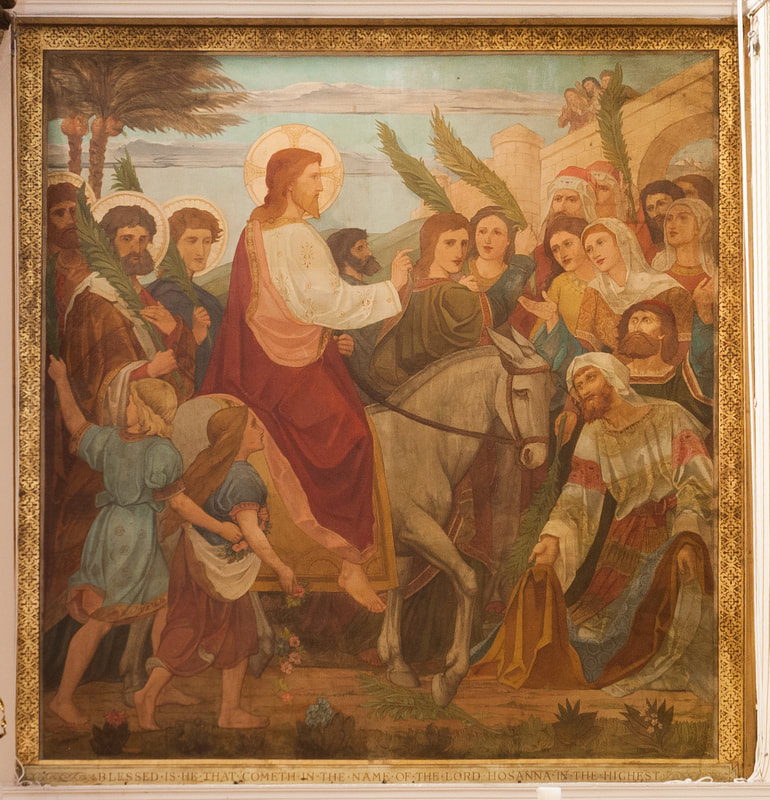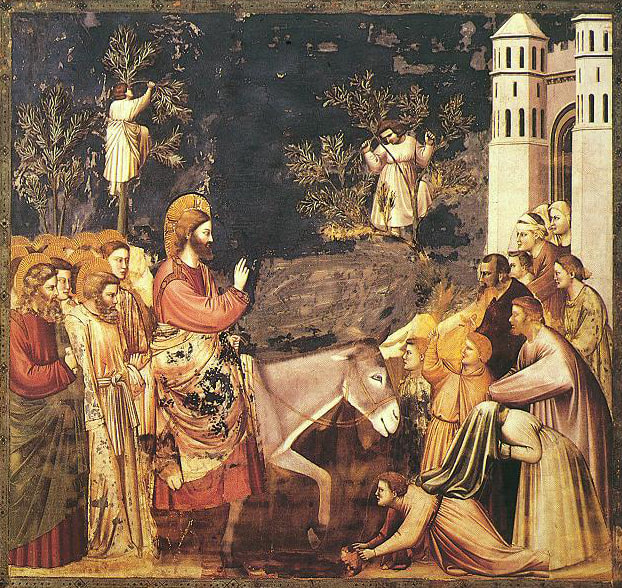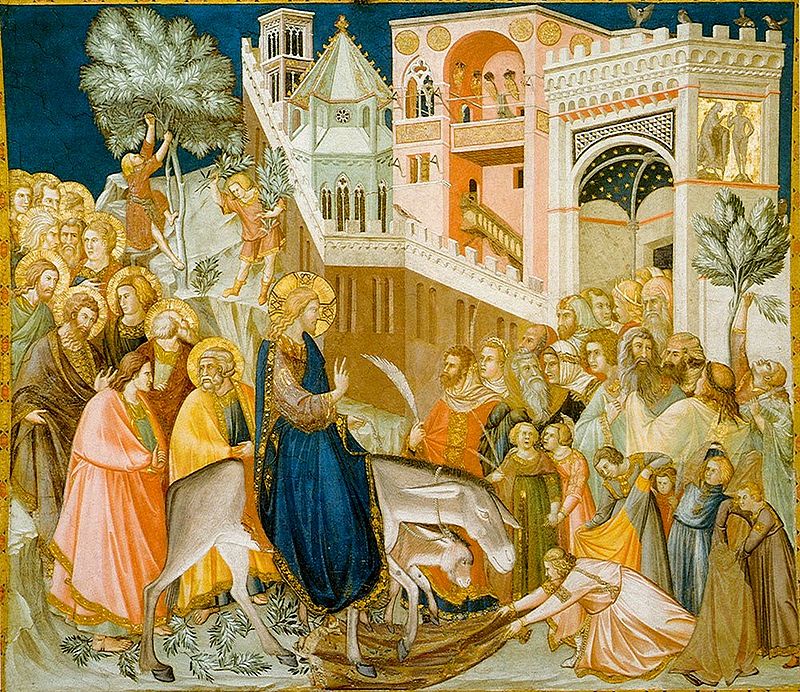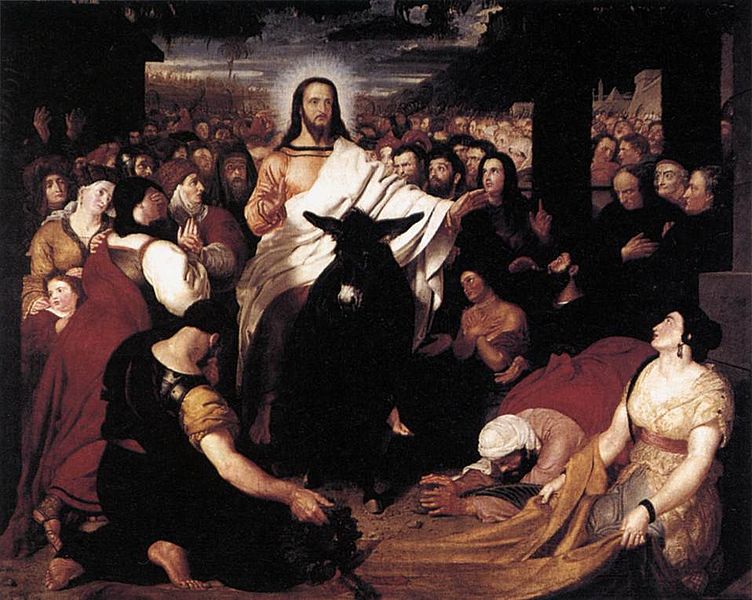Matthew 21:1-9
Pastor James Preus
Trinity Lutheran Church
December 3, 2023
Over the past few weeks, we have been focusing on Christ’s return in judgment. Seared in our memory is the image of the unrighteous being banished to eternal punishment prepared for the devil and his angels, and foolish virgins banging on the door to the Wedding Banquet, Christ refusing to let them in. Christ’s return in glory is a terrifying thought. How can we be prepared for His coming? And so, we begin a new Church year preparing for Christ’s second coming in glory by focusing on His first coming in the flesh.
Yes, that mighty judge, who will come to us riding on the clouds with the voice of an archangel and the sound of a trumpet, who will judge the living and the dead from His glorious throne, has already come to us. Yet, He did not come in terror, but in humility. He was born a poor baby, laid in a manger, and first worshipped by lowly shepherds. He grew up among his brothers with no form of majesty or beauty that we should desire Him (Isaiah 53:2). And finally, He enters Jerusalem, His holy city, riding on a borrowed donkey, to the singing and cheering of little children and commoners.
It is essential, if you are to be prepared for Christ’s coming in glory, that you first know Him in His coming in the flesh. It is only through Christ’s coming in humility that you can receive Him in faith, so that you may stand unashamed on the Last Day. The charming Christmas hymn states it well, “Come from on high to me; I cannot rise to Thee. Cheer my wearied spirit, O pure and holy Child; Through Thy grace and merit, Blest Jesus, Lord most mild, Draw me unto Thee! Draw me unto Thee!”
We cannot rise to Christ! Our sins keep dragging us down. We cannot by our own merits or works prepare ourselves for Christ’s coming. Like the tower of Babel, Pharoah, Ninevah, King Nebuchadnezzar, Lucifer, and everyone else who exalts himself before God, we are cast down to the dust when we try reach God. That is why Christ’s return in judgment is so scary. Christ must come down to us, not in glory, lest we die, but in meekness, humility, clothed in the flesh of a servant, so that He may serve us and ransom us from our sins (Matthew 20:28).
And that is exactly what He does. As we watch Jesus ride into Jerusalem on a donkey, we remember that He came in humility as a baby. We must not see Christ’s second coming in glory without seeing His first coming as a child! And as we watch Jesus ride into Jerusalem on a donkey, we remember that His destination is the cross, where He will lay down His life for us. And so, when we see Christ Jesus coming to us on the clouds with angels and archangels is His wake, we see Him who was laid in the straw for us, who rode into Jerusalem for us, whose hands and feet were pierced for our transgressions. We see Him who comes to save us.
Yet, we obviously aren’t watching Jesus ride into Jerusalem this morning, nor are we peering into His cradle-stall, nor can we kneel before His cross or empty tomb. Yet, Christ still comes to us today to prepare us for His glorious return. The words of the prophet Zechariah still apply to us today, “Behold, your king is coming to you!” Yet, instead of riding in humble, and mounted on a donkey, He comes to us humble and mounted on the words spoken by His lowly servant, and upon water poured on a child, and upon bread and wine eaten as the very body and blood of Christ. This is how Christ comes to us today in His grace, so that we may believe in Him and thereafter receive Him in glory.
Yet, as the high priests and loftiest of the people sneered at Jesus’ advent into Jerusalem on a donkey, so people sneer at Jesus’ coming to us in Word and Sacrament. “It’s boring! It’s always the same! I’ve heard this story before; why do I need to hear it again? I’ve had communion before; I think that should last me quite a while. I know what it tastes like. I’ve got more exciting things to do.” Thus, the hearts of the lapsed speak when they turn away from receiving Christ, who comes to us with His grace. They find the way Christ comes to them with His grace boring, uninteresting, not entertaining enough (As if the purpose of worshiping Christ is for Him to entertain you!).
Of course, this is rich coming from those who do not get bored with their same old idols, lusts, and vices. Their idols remain the same: money, job, sports, booze, and drugs. These are boring, uninteresting idols, which predictably disappoint as they always do when you make them into your god. Their lusts provide no lasting stimulus except the persistent whip of a slavedriver, for one who follows his lusts is a slave to them. And the vices of hatred, anger, jealousy, laziness, pride, and gossip are all boring, repeatable, and destructive no matter how often you return to them. And yet, without seeing the irony at all, those who call the Lord’s Supper boring, the preaching of Christ predictable, and the forgiveness of sins unstimulating, religiously return to these idols, lusts, and vices, which lead only to shame, death, and hell.
And so, if you are going to receive Christ in His grace, you must humble yourself. Jesus will not rise to you. He will not meet you in your pride. He will only meet you in reality, that is, in your lowliness. So, not only do we humble ourselves by acknowledging our sin before our Creator, but we humble ourselves by receiving Christ in the seemingly mundane, through the words of a man, we don’t think is better than us; through bread and wine, that we would not crave, if it did not promise the forgiveness of sins, life, and salvation.
And when we receive Christ by these meek means, we realize how very gracious He is to us. Over this past Church year, did you attempt to rid yourself of some of those idols, lusts, and vices, which fill you with shame? If you are a Christian, you made the attempt. Well, how did you do? Have you cast every idol from the throne of your heart? Have you turned the whip on your lusts? Have you replaced your vices with virtue?
And when you consider this, you’ll see how comforting it is that Christ continues to come to you in the same old way, week after week, proclaiming Himself your Redeemer, who forgives your sins, feeding you His body and blood, again and again, as a token of peace from God on high. He doesn’t tire of forgiving you. He doesn’t get bored with pardoning your guilt. Rather, week after week, as you come ashamed that you returned to your boring, predictable, destructive idols, lusts, and vices, Christ comforts you in the same familiar way, assuring you of forgiveness, cleansing your guilty conscience, and strengthening you to do better.
How terrified the citizens of Jerusalem would have been if Jesus had ridden into Jerusalem on a chariot of fire with legions of seraphim and cherubim with flaming swords. The destruction would have been worse than that brought by Nebuchadnezzar or Titus. Yet, how glad they were to receive Him in meekness as their King! And so, we will not tire of receiving our Savior in His grace and mercy, because He comes to meet us in our weakness, so that He may make us strong.
Yet, to whom does Christ come? The prophet Zechariah proclaimed His coming to the daughter of Zion, that is, the citizens of Jerusalem. Zion is the mountain on which Jerusalem is built, so Zion and Jerusalem are used interchangeably in Scripture. Jerusalem is the ancient capital of Israel, where King David reigned. Yet, Jerusalem is also recognized as the heavenly city where God’s people will dwell for eternity. St. Paul tells us that this heavenly Jerusalem is our mother (Galatians 4:26). So, the daughters of Zion, the true citizens of the heavenly Jerusalem are those who have faith in Christ and receive His coming in grace. Christ comes to His holy Christian Church!
So, if you are to receive Christ as He comes with His grace to forgive and save, then you must be a daughter of Zion, you must be a citizen of the heavenly Jerusalem. You must be a member of Christ’s Church, for He enters no other gate to bring righteousness and salvation except through the gates of Jerusalem. Some smart Alecs will spout that Christ can come to us in any way He likes, so we don’t need to receive Him through the Church. Yet, we don’t choose how Jesus comes to us. Jesus does. How He could come is irrelevant. All that matters is how He does come. And He comes to the daughter of Zion. He enters the gates of Jerusalem. He comes to His bride, the Holy Christian Church through His Word and Sacraments to be received by faith.
And so, we should behave like those saints in Jerusalem, who laid their garments before Him and waved palm branches in His honor, singing, “Hosanna in the Highest! Blessed is He who comes in the name of the Lord!” And indeed, we are singing that song today! We rise as a bride to meet Him every time we come to receive His grace, listening to His preaching, and receiving His body and blood.
In humility Christ comes to save us by His grace and merit. Yet, in His humility Christ also leaves us an example to live in humility. While good works do not save us, saving faith produces good works. A sinful life, on the other hand, can prove detrimental to saving faith. This is why St. Paul warns us to cast off the works of darkness, and to walk properly as in the daytime. We do this by putting on Christ. Like the donkey, carrying Jesus as His burden, so we carry Christ. We are humble, as He is humble, considering the needs of others before our own and doing unto them as we would have them do unto us. And bearing Christ, we cannot be put to shame. We do not worry about our works being good enough, being bright and shiny enough, being noticed by the world. We are concerned only with humbly bearing Christ as we live with one another. This causes us to be quick to forgive, slow to anger, and ready to make peace for Christ’s sake.
Jesus’ coming to us in the meekness of His flesh, whereby He earned our salvation, takes the terror of the final judgment away from us. Jesus’ coming to us in the humility of the Word and Sacraments prepares us to meet our Lord on that glorious day and to live with our neighbor in peace today. Let us not despise Christ in His humility, but rather, let us in humility meet Him as He condescends to us, so that we may also welcome Him in His glory. Amen.




 RSS Feed
RSS Feed